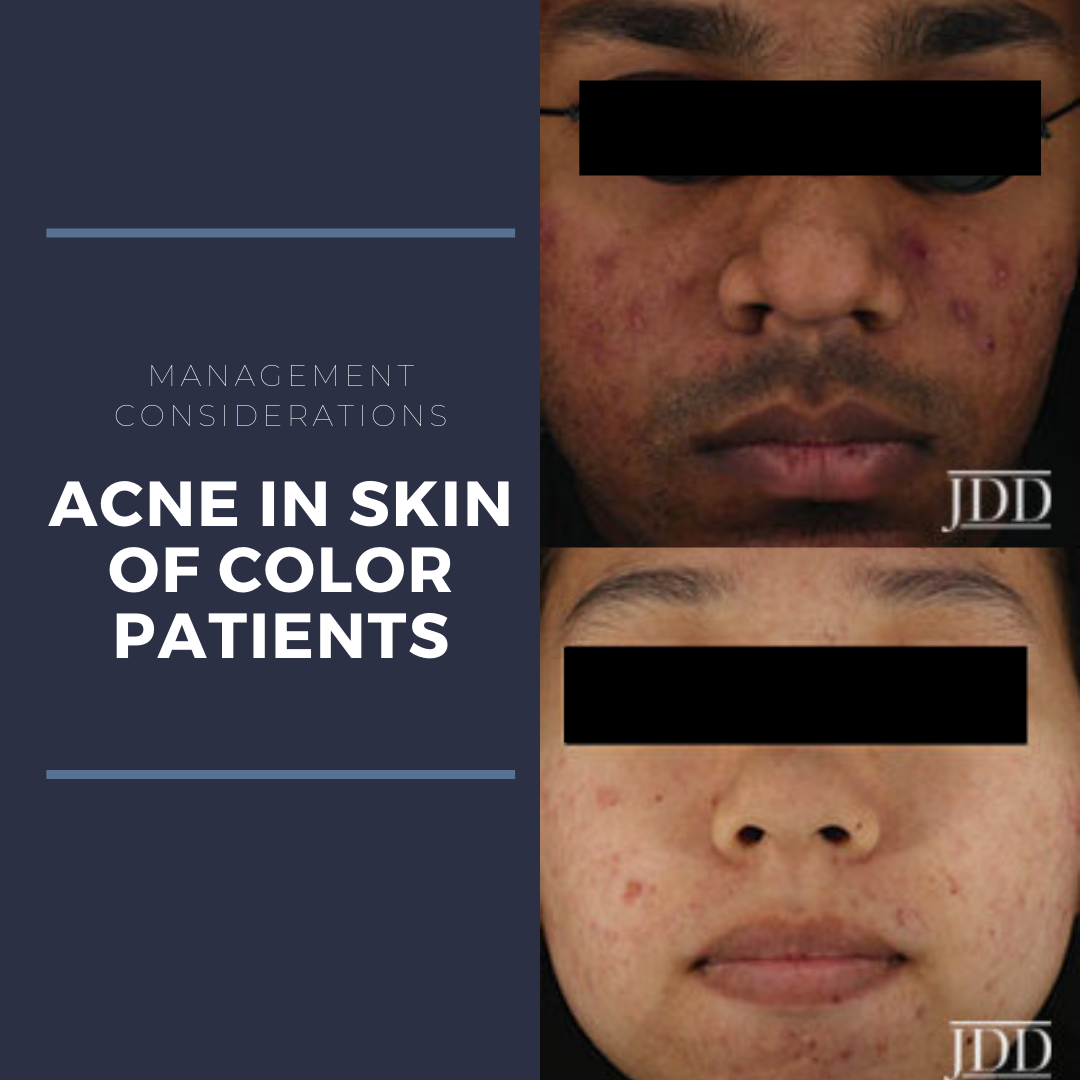Management Considerations for Skin of Color Patients with Acne
 Acne is the most common skin condition in the United States. Although it affects almost 50 million individuals annually, how it affects each person varies. Many epidemiologic studies have shown that acne is the most common presenting complaint in patients with Fitzpatrick skin types IV-VI. However, post-inflammatory hyperpigmentation is a common sequela of acne in patients of skin of color and a p …
Acne is the most common skin condition in the United States. Although it affects almost 50 million individuals annually, how it affects each person varies. Many epidemiologic studies have shown that acne is the most common presenting complaint in patients with Fitzpatrick skin types IV-VI. However, post-inflammatory hyperpigmentation is a common sequela of acne in patients of skin of color and a p …
 Acne is the most common skin condition in the United States. Although it affects almost 50 million individuals annually, how it affects each person varies. Many epidemiologic studies have shown that acne is the most common presenting complaint in patients with Fitzpatrick skin types IV-VI. However, post-inflammatory hyperpigmentation is a common sequela of acne in patients of skin of color and a p …
Acne is the most common skin condition in the United States. Although it affects almost 50 million individuals annually, how it affects each person varies. Many epidemiologic studies have shown that acne is the most common presenting complaint in patients with Fitzpatrick skin types IV-VI. However, post-inflammatory hyperpigmentation is a common sequela of acne in patients of skin of color and a p … Continue reading "Management Considerations for Skin of Color Patients with Acne"


 On this Mnemonic Monday, we challenge you to remember diseases or medication exposures associated with Elastosis Perforans Serpiginosa (EPS) with the following mnemonic:
MAD PORES
Marfan
Acrogeria
Down’s
Penicillamine
Osteogenesis imperfecta
Rothmund-Thomson
Ehlers-Danlos
Scleroderma
Click HERE to print your mnemonic card.
Study More!
Need a refresher on Perforating D …
On this Mnemonic Monday, we challenge you to remember diseases or medication exposures associated with Elastosis Perforans Serpiginosa (EPS) with the following mnemonic:
MAD PORES
Marfan
Acrogeria
Down’s
Penicillamine
Osteogenesis imperfecta
Rothmund-Thomson
Ehlers-Danlos
Scleroderma
Click HERE to print your mnemonic card.
Study More!
Need a refresher on Perforating D …  Articles in this month’s Patient Buzz address questions about skincare products and how to use them. Do oils hydrate the skin? Are products with snail slime effective? What ingredients to avoid in homemade skin care? What’s the best way to introduce a new skincare product to your routine?
Be prepared for your patient’s questions about skincare products by reviewing this list of dermatolog …
Articles in this month’s Patient Buzz address questions about skincare products and how to use them. Do oils hydrate the skin? Are products with snail slime effective? What ingredients to avoid in homemade skin care? What’s the best way to introduce a new skincare product to your routine?
Be prepared for your patient’s questions about skincare products by reviewing this list of dermatolog …  Dr. Lester is the Director of the Skin of Color Program at the Department of Dermatology University of California San Francisco. Wow! This means we got a “two for one special” from her lecture, not only learning about the truths and myths associated with the use of isotretinoin in acne but also recognizing that those who are underrepresented minorities or socioeconomically disadvantaged may no …
Dr. Lester is the Director of the Skin of Color Program at the Department of Dermatology University of California San Francisco. Wow! This means we got a “two for one special” from her lecture, not only learning about the truths and myths associated with the use of isotretinoin in acne but also recognizing that those who are underrepresented minorities or socioeconomically disadvantaged may no …  On this Mnemonic Monday, we challenge you to remember major causes of drug-induced Stevens-Johnson Syndrome (SJS) with the following mnemonic:
SANA
Sulfonamides
Anticonvulsants
NSAIDs
Allopurinol
Click HERE to print your mnemonic card.
Study More!
Need a refresher on Stevens-Johnson Syndrome? Check out the following pages of your 2019 Derm In-Review Study Guide:
Stevens-Johnso …
On this Mnemonic Monday, we challenge you to remember major causes of drug-induced Stevens-Johnson Syndrome (SJS) with the following mnemonic:
SANA
Sulfonamides
Anticonvulsants
NSAIDs
Allopurinol
Click HERE to print your mnemonic card.
Study More!
Need a refresher on Stevens-Johnson Syndrome? Check out the following pages of your 2019 Derm In-Review Study Guide:
Stevens-Johnso …